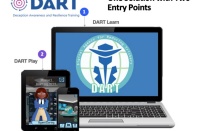The Impossible Project: Learning to think at the limits of the possible, together
Dalia Antonia Caraballo Muller, PhD, Associate Professor, Department of History, University at Buffalo
The Impossible Project is a learning experience that prepares students to take on grand challenges by teaching them to BEND: Build collective resilience, Enhance creative critical thinking, Nurture true collaboration and Discover purpose through dedication to social and planetary good.
IP students have worked to end discrimination, make computing antiracist and eradicate white supremacy. Please join us for a brief overview of the project’s history and core principles followed by a round table discussion of our experience with the Impossible Project including how we collaborate across the humanities/STEM divide, how we work on/toward/with the impossible, and what it is like to learn in an open-ended, student-led classroom.
Student panelists will share their experiences with the Impossible project. Come to hear their reflections on:
- What did you think when you were told you’d be solving an impossible problem?
- What did/do you find most disorienting about the work once you started?
- What has it meant to you to have the chance to weigh in on something so important?
- How was it to work with your peers from other disciplines on this project? What are the opportunities and challenges of this kind of collaboration in your opinion?
- The impossible project leads you not to a solution, but to a new point of departure. What does that mean to you?
- What was the single most important thing that you came to or have come to realize through this project?
- If you completed a project, how did you feel about it after the finale? Will the project stay with you? if so, why?
About Dalia Muller
Dr. Dalia Antonia Caraballo Muller is a bilingual, multi-cultural, multi-racial researcher and educator. Her twin passions are the study of the African Diaspora in Latin America and the Caribbean, and the study of transformative learning models in higher education. The through line that connects her historical work and her work in education is the concept of “impossibility.” She researches Black intellectuals in early 20th century Cuba who thought at the limits of the possible as they staked claims to rights, dignity and equality. In the classroom, Dr. Caraballo Muller invites her students to stretch their minds and think at the limits of the possible in order to dream up new futures for our ailing world and planet. While she is committed to opening minds and opportunities for all her students equally, supporting black and brown student success is core to her personal and professional mission.




